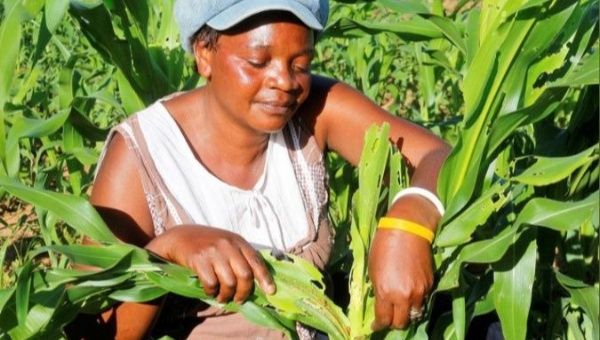Ethiopia: Women Run Co-Ops, UN Collaboration Yields Good Harvest, Rural Savings
AFRICA, UNITED NATIONS, ECONOMICS, COOPS-COOPERATION-SHARING, DEVELOPMENT, 6 Aug 2018
teleSUR – TRANSCEND Media Service
The UN Women Representative for Ethiopia, Letty Chiwara, said women-run agricultural co-ops are vital to sustainable farming practices.

Women comprise 50 per cent or more of the agricultural labour force in parts of Africa and Asia. | Photo: Reuters
3 Aug 2018 – Well-established women-run agricultural cooperatives in Ethiopia have long served as an alimentary and economic backbone for many rural areas in the East African country. They’ve teamed up with a joint UN program called, “Accelerating Progress towards the Economic Empowerment of Rural Women,” which provides them with time-saving machinery and loans to aid sustainable agricultural production and encourages rural women’s economic empowerment through savings.
RELATED: Ethiopia vs Europe: The Intellectual Property of an Ancient Grain, Teff
Letty Chiwara, the UN Women Representative for Ethiopia, explained that agricultural cooperatives, particularly those operated by women, are vital to sustainable farming practices.
“Injecting basic labor and time-saving technologies, along with the relevant knowledge, to smallholder women farmers’ cooperatives are critical elements in the sustainable escalation of the value chain in agriculture. This, in turn, results in a quality of life improvements for women farmers and communities at large,” she says.
A beneficiary of the UN program, which was launched in the regions of Afar and Oromia in 2014, is Kamso Bame, a mother of 12 and owner of 2.5 acres of land. The tractor provided to her has drastically reduced days of grueling labor in the field.
She is just one of the more than 2,000 small family farmers participating in the UN program.
The Accelerating Progress towards the Economic Empowerment of Rural Women is a five-year program. It collaborates with ten cooperatives, with 48 to 516 members each, according to AllAfrica, and benefits roughly 14,000 family members.
Women comprise, on average, 43 percent of the agricultural labor force in developing countries. The amount varies significantly across different regions, from 20 percent or less in Latin America to 50 percent or more in parts of Africa and Asia, according to AllAfrica.
httpv://www.youtube.com/watch?v=8m3xB26Nslk
Go to Original – telesurtv.net
DISCLAIMER: The statements, views and opinions expressed in pieces republished here are solely those of the authors and do not necessarily represent those of TMS. In accordance with title 17 U.S.C. section 107, this material is distributed without profit to those who have expressed a prior interest in receiving the included information for research and educational purposes. TMS has no affiliation whatsoever with the originator of this article nor is TMS endorsed or sponsored by the originator. “GO TO ORIGINAL” links are provided as a convenience to our readers and allow for verification of authenticity. However, as originating pages are often updated by their originating host sites, the versions posted may not match the versions our readers view when clicking the “GO TO ORIGINAL” links. This site contains copyrighted material the use of which has not always been specifically authorized by the copyright owner. We are making such material available in our efforts to advance understanding of environmental, political, human rights, economic, democracy, scientific, and social justice issues, etc. We believe this constitutes a ‘fair use’ of any such copyrighted material as provided for in section 107 of the US Copyright Law. In accordance with Title 17 U.S.C. Section 107, the material on this site is distributed without profit to those who have expressed a prior interest in receiving the included information for research and educational purposes. For more information go to: http://www.law.cornell.edu/uscode/17/107.shtml. If you wish to use copyrighted material from this site for purposes of your own that go beyond ‘fair use’, you must obtain permission from the copyright owner.
Read more
Click here to go to the current weekly digest or pick another article:
AFRICA:
- Sudan’s Paramilitary Attacks Largest IDP Camps amid World’s Biggest Displacement Crisis, Killing Over 100
- Flooding Displaces Thousands amid Ongoing Unrest in Eastern DR Congo
- Teaching Peace: Nurturing Young Peacemakers in Ghana through Education
UNITED NATIONS:
- Israel's Gaza Massacre: Are We Witnessing the DEMONIC?
- Putin’s Proposed UN Control Over Ukraine Is Well Intentioned but Will Be Tough to Implement
- The Christian Zionist Leading the International Court of Justice
ECONOMICS:
- Can We Exit from a World of Debt?
- The Global North Has Nine Times More Voting Power at the IMF Than the Global South
- Architectura Socio-Ecologika: Evidence Base
COOPS-COOPERATION-SHARING:
- In a Violent Economy, People of Faith Try Cooperatives
- Formerly Incarcerated Women Launch Chicago Worker Cooperative
- The Boss Who Put Everyone on 70K
DEVELOPMENT: